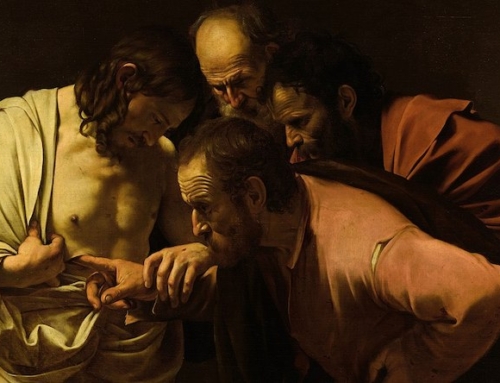Jimi Hendrix probably didn’t have Lent in mind when he wrote “Purple Haze.” But Lent can feel like a “purple haze, all around,” and not just because of the vestments. In the confusing mix of emotions, one might echo Hendrix, “Am I happy or in misery?”
While Lent is a time of penance, I cannot help but find it a joyful season. That might seem paradoxical. What is joyful about meatless Fridays, cold showers, or somber vestments? you may ask. It’s what they are geared to that makes these things joyful. They all direct us to and free us for our salvation in Jesus Christ, the source of our joy. The Church makes this clear with the celebration of Laetare Sunday on the fourth Sunday of Lent when the Mass begins with the call to “rejoice, O Jerusalem.” Joy is central to Lent.
The purple vestments and liturgical trappings evoke an atmosphere of mourning and penance. But this is not a mourning without hope. Because of the expensive and difficult process of extracting purple dye from sea snails in the ancient world, purple became a color of royalty. Roman emperors and Hebrew kings dressed in purple. Jesus Christ, the true King of the Universe, was Himself clothed in purple, but in much different circumstances. The soldiers leading Jesus to the Cross “clothed him in a purple cloak, and plaiting a crown of thorns they put it on him. And they began to salute him, ‘Hail, King of the Jews!’” (Mk 15:17–18). Although they meant to mock Jesus, the soldiers actually revealed what kind of King we have. We have a King who suffered to save us. And this is the source of our joy. The purple “all around” reminds us that because of our King’s Passion, we can hope one day to hear those sweet words, “enter into the joy of your master” (Mt 25:21).
Our earthly lives are a preparation for that joy. We are composites of body and soul, so what we do in the body affects our souls. Fasting from food touches the soul, not just the body. Hunger in the body produces hunger in the soul. Servais Pinckaers, the Dominican moral theologian, described fasting as “depriving ourselves of bodily nourishment in order to awaken the hunger of the heart, hunger for God.” The point of fasting is to become hungry for God. Our hearts are always hungry for something, longing for something. But our desires often go after things that cannot truly satisfy. Fasting helps to reorient our desires, to awaken our desires to the reality we are made for. We can recognize fasting as a joyful experience when we see that it guides our desires to “the fullness of joy in [God’s] presence” (Ps 16:11).
Penance frees our souls for joy. Penances might seem more like a form of slavery than freedom. We bind ourselves to follow some list of rules, like no desserts, hot showers, or elevator use. Don’t these rules restrict our freedom? Only in the narrow understanding of freedom as instant gratification. These penances actually strengthen our will to choose the good over the easy. The easy might please for a moment, but it is the good that really makes us happy. Penance helps free us from the effects of sin which cause us to prefer lesser goods. It may be a little thing, but giving up that dessert helps free us for happiness.
Dante illustrated this joy in the souls in Purgatory. As they arrive, “those happy souls” sing the psalm of freedom, “When from the land of Egypt Israel came” (Ps 113:1). They are joyful because they know that the penance of Purgatory is the process by which God will purify and free their wills. That is why Virgil’s last words to Dante at the top of the Mount of Purgatory are, “Your judgment now is free and whole and true… Lord of yourself I crown and miter you.” At the end of penance is freedom. In the purple haze of Lent, then, there is the answer to Hendrix’s question: I am happy.
✠
Image: Public domain







